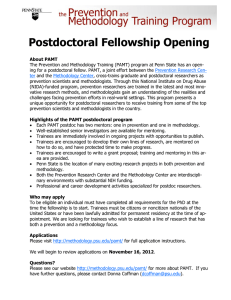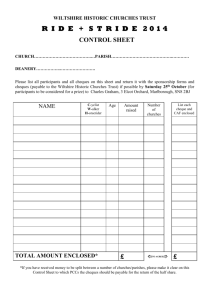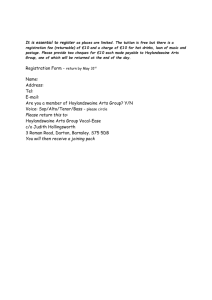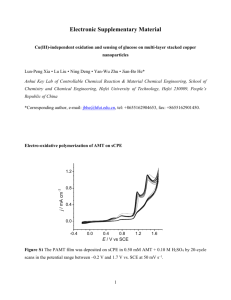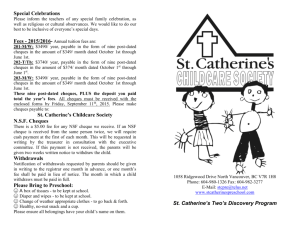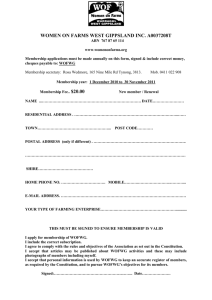internal controls
advertisement
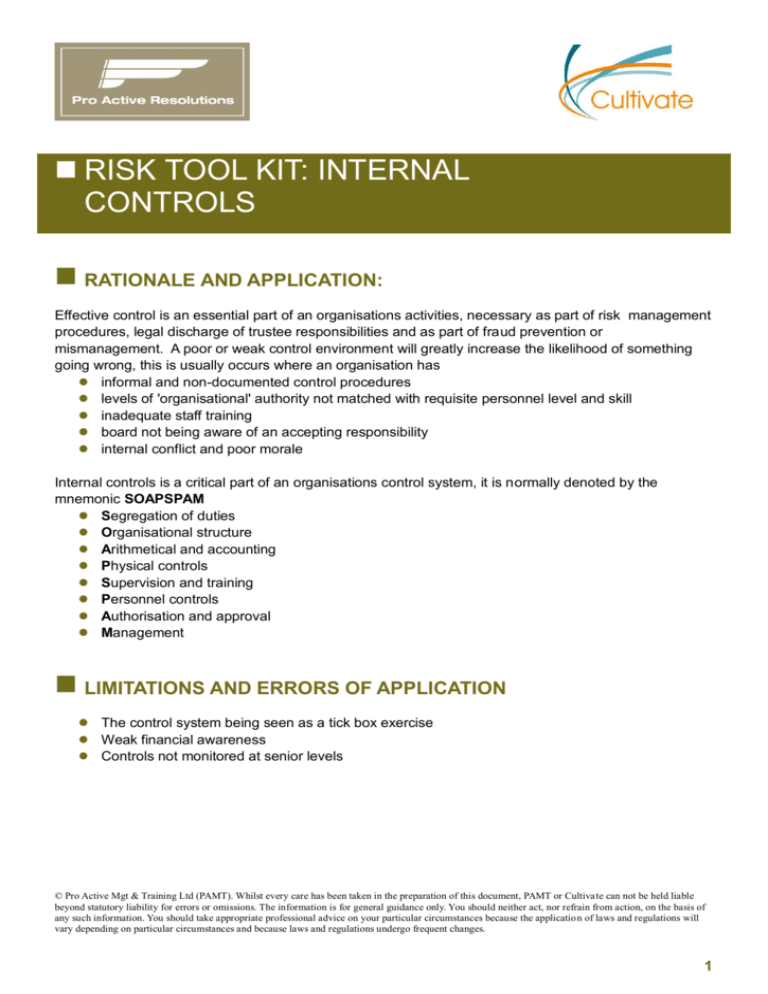
RISK TOOL KIT: INTERNAL CONTROLS RATIONALE AND APPLICATION: Effective control is an essential part of an organisations activities, necessary as part of risk management procedures, legal discharge of trustee responsibilities and as part of fraud prevention or mismanagement. A poor or weak control environment will greatly increase the likelihood of something going wrong, this is usually occurs where an organisation has ● informal and non-documented control procedures ● levels of 'organisational' authority not matched with requisite personnel level and skill ● inadequate staff training ● board not being aware of an accepting responsibility ● internal conflict and poor morale Internal controls is a critical part of an organisations control system, it is normally denoted by the mnemonic SOAPSPAM ● Segregation of duties ● Organisational structure ● Arithmetical and accounting ● Physical controls ● Supervision and training ● Personnel controls ● Authorisation and approval ● Management LIMITATIONS AND ERRORS OF APPLICATION ● ● ● The control system being seen as a tick box exercise Weak financial awareness Controls not monitored at senior levels © Pro Active Mgt & Training Ltd (PAMT). Whilst every care has been taken in the preparation of this document, PAMT or Cultivate can not be held liable beyond statutory liability for errors or omissions. The information is for general guidance only. You should neither act, nor refrain from action, on the basis of any such information. You should take appropriate professional advice on your particular circumstances because the application of laws and regulations will vary depending on particular circumstances and because laws and regulations undergo frequent changes. 1 EXAMPLES: INTERNAL CONTROLS CASH AND INTERNAL CONTROL ● ● ● ● ● ● ● ● ● Control the opening of post so that two people open it. Keep a rough cash book and record all cash received through the post, this should be regularly reconciled with the actual receipts by an appropriate person. Ensure that any cheques received are stamped such that they can only be paid into the organisation’s bank account; Pre-number all receipt books and keep secure all unused books; Send customers regular statements; As far as practicable separate duties and responsibilities of people writing up the sales day book and the sales ledger; Any write off for bad debts should only be permitted by a responsible individual; Regular bank reconciliation’s should be prepared; Cash and takings should be banked daily intact; Cash sales should be recorded at the time they are made, either using pre-numbered sales notes or via a till. Management should regularly review and check all cash transactions SALES AND INTERNAL CONTROL ● ● ● Pre-number all despatch notes and regularly reconcile with copy sales invoices by a responsible individual; No goods should leave the organisation without an accompanying despatch note; Ensure that there is an effective procedure for credit control. Credit limits for new customers should be established before orders are processed and there should be effective procedures for ensuring that credit limits for existing customers are not exceeded; PURCHASES AND INTERNAL CONTROL ● ● ● ● ● Orders to be authorised by the purchasing department where one exists; Pre-printed and pre-numbered order forms to be used; Goods received notes should record the nature and quantity of goods received. Goods received notes should be pre-numbered and checked to the purchase order; Invoices should be checked with the goods received notes and purchase orders; Separate the duties of those responsible for making out the purchase order, those responsible for checking the goods and making out the goods received notes and those responsible for the checking of the invoices to the goods received notes and the purchase orders; © Pro Active Mgt & Training Ltd (PAMT). Whilst every care has been taken in the preparation of this document, PAMT or Cultivate can not be held liable beyond statutory liability for errors or omissions. The information is for general guidance only. You should neither act, nor refrain from action, on the basis of any such information. You should take appropriate professional advice on your particular circumstances because the application of laws and regulations will vary depending on particular circumstances and because laws and regulations undergo frequent changes. 2 ● Separate the duties of those signing and preparing cheques; ● People who prepare the cheques should not be able to approve or initiate documents; ● Supporting documents should be cancelled, either before or after signing the relevant cheques, to prevent further payments. The document may be date stamped and the cheque number marked on it. ● ● ● ● ● ● ● WAGES AND INTERNAL CONTROL Keep records for each employee; Ensure regular checks between the records maintained in the wages department to the authorised historical records; Keep adequate and approved time records, overtime to be properly authorised; Reconcile payroll records to time sheets; People independent of the payroll preparation should check the payroll; Paying out of wages should be properly supervised, receipts being obtained from employees; Unclaimed wages should be immediately recorded after the conclusion of the payout. Any unclaimed wages subsequently claimed should be signed for. PETTY CASH AND INTERNAL CONTROL ● ● ● Maintain petty cash on an imprest basis. Cash in hand plus expense vouchers should always equal the amount of the float; Payments only to be made on the production of a properly completed voucher; IOUs or post dated cheques should not be used as substitutes for cash. FURTHER POINTS: CIRCUMSTANCES LEADING TO FRAUD ● ● ● ● Absence of an effective system of internal check Absence of an internal audit function - more appropriate for larger organisations Chaotic accounting records Undue reliance by management upon the integrity of the staff Potential warning signs of fraud are an employee who: ● Takes no holidays or often stays late with very little evidence of work having been completed ● Has an extravagant lifestyle which appears to be beyond their salary means ● Frequently receives over-generous gifts or hospitality from suppliers ● Works at a location due to be closed or has been passed over for promotion on numerous ● ● ● ● occasions Appears to generate good results when others are struggling to meet targets Seems unusually concerned at the prospect of audits or visits from review teams Regularly breaks and bends rules Has financial problems © Pro Active Mgt & Training Ltd (PAMT). Whilst every care has been taken in the preparation of this document, PAMT or Cultivate can not be held liable beyond statutory liability for errors or omissions. The information is for general guidance only. You should neither act, nor refrain from action, on the basis of any such information. You should take appropriate professional advice on your particular circumstances because the application of laws and regulations will vary depending on particular circumstances and because laws and regulations undergo frequent changes. 3 ● ● Is the subject of complaints from employers or customers Rules underlings with a rod of iron and unnecessary anger, sarcasm and criticism, so they become too frightened to question events. © Pro Active Mgt & Training Ltd (PAMT). Whilst every care has been taken in the preparation of this document, PAMT or Cultivate can not be held liable beyond statutory liability for errors or omissions. The information is for general guidance only. You should neither act, nor refrain from action, on the basis of any such information. You should take appropriate professional advice on your particular circumstances because the application of laws and regulations will vary depending on particular circumstances and because laws and regulations undergo frequent changes. 4
